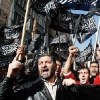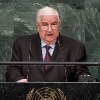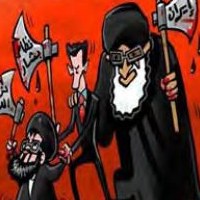![]()
Wed, June 19, 2013
This article is een update for the June 17, 2013 study “Hezbollah Involvement in the Syrian Civil War,” published in Hebrew by The Meir Amit Intelligence and Terrorism Information Center. The updated English version was published in three parts here: part 1, part 2 and part 3.
Overview

Hassan Nasrallah, Hezbollah leader, gives a speech stressing Hezbollah’s determination to support the Syrian regime (Website of the Islamic resistance in Lebanon, June 14, 2013).
Following the victory in the campaign for Al-Qusayr, Hezbollah is working to strengthen its foothold on the ground while preparing to support the Syrian forces to take over Aleppo, the second most important and second largest city in Syria. According to the Sunday Times, based on “senior sources,” Hezbollah is “preparing to spearhead the ground offensive to drive rebels from Syria’s second city of Aleppo.” According to a “Hezbollah commander,” about 800 Hezbollah fighters were said to have helped secure the city and cut off supplies to the rebels from Lebanon. He also said that “the battle for Aleppo will be fought by Syria’s National Defense Force [NDF] and the Syrian army, with Hezbollah supervising and providing military tactical advice on how to coordinate and conduct the offensive.” He added that “Aleppo is more of a Syrian matter” (Sunday Times, June 16, 2013).
The Arab media also reported that Hezbollah was preparing for the battle for Aleppo after Al-Qusayr had been taken. According to a source in Aleppo, a group of 300 Lebanese Hezbollah operatives, among them Iranian officers, arrived at the military academy located in the city at the beginning of June 2013. They were reinforcements who had come to participate in the campaign waged in the environs north of Aleppo (Facebook page of Aleppo News, June 12, 2013). The commander-in-chief of the free Syrian army, General Salim Idris, said that Hezbollah and Iranian operatives were stationed at a number of sites in Aleppo (Skype interview with Lebanese Al-Mayadeen TV, June 12, 2013). It was also recently reported that Hezbollah operatives were participating in the fighting in the environs of Aleppo (Alarabia.com website).
It is not yet clear how many Hezbollah operatives have been allotted for participation in the battle for Aleppo. It is also not known if the Hezbollah operatives sent to Aleppo were taken from the force that fought at Al-Qusayr or if they were newly arrived in Syria from Lebanon. In any event, the statement made by the Hezbollah commander to the Sunday Times, that Hezbollah’s role in Aleppo would be one of supervision and advice, might indicate that Hezbollah seeks to behave cautiously in the battle for Aleppo. That is because aware of the internal criticism and military, political and image-related difficulties involved in fighting in Aleppo, and its environs. Nevertheless, the very fact of Hezbollah’s participation in the battle for Aleppo can potentially suck the organization even further into the Syrian civil war, for which they will have to pay a high price.[1]
Nasrallah’s Speech
On June 14, 2013, Hassan Nasrallah gave a speech for “Injured Resistance Fighter Day,” in which he stressed Hezbollah’s commitment to continue supporting the Syrian regime. Hezbollah’s involvement in the Syria war, he said, was not undertaken suddenly and without thought, but was rather the product of an orderly assessment of the situation based on an analysis of the events as they occurred. It was intended, he said to help undermine “a dangerous American-Israeli takfir plot”[2] whose objective was to bring about the collapse not only of Syria but of the entire region, including Lebanon. Thus Hezbollah had decided to become involved in the fighting in Syria and to accept all the consequences, including dead and wounded (“foiling this dangerous plot is far more important that any sacrifice”). Practically speaking, said Nasrallah, even after Al-Qusayr Hezbollah had not changed its policies: “Wherever we have to be, we will be there, and the responsibility we accepted [i.e., supporting the Syrian regime] we will continue to accept, and there is no need for further details” (Al-Manar, June 14, 2013).[3]
In his speech Nasrallah stressed Hezbollah’s determination to continue its aid for the Syrian regime, exploiting the momentum of its military and morale victory at Al-Qusayr. However, while he could explain Hezbollah’s intervention at Al-Qusayr as defense of the Shi’ites, his reason for fighting in Aleppo was completely different and more relevant: Hezbollah, he said, was helping the Syrian regime suppress a rebellion supported by the West and Al-Qaeda which was liable to harm Iran and Hezbollah’s strategic interests in Syria, Lebanon and the entire region. Thus Nasrallah admitted, although indirectly, that Hezbollah had become an actor in a wider campaign with regional and global significance which could expose Hezbollah to greater Shi’ite, internal Lebanese and pan-Arab criticism.[4]
The Sectarian Celebration of the Victory at Al-Qusayr
Below are pictures from a video broadcast on Al-Arabiya TV (affiliated Saudi Arabia) and Al-Jazeera TV showing Hezbollah operatives celebrating the victory at Al-Qusayr, waving banners which are clearly Shi’ite. A YouTube video also showed young men jumping over bodies at Al-Qusayr and shouting sectarian slogans (Al-Safir, Lebanon, June 11, 2013). Hassan Nasrallah, who was fully aware of the potential danger of the videos (in light of the escalating anti-Shi’ite rhetoric in the Arab-Muslim world), made note of the Al-Arabiya video of the celebration and gave the events his own interpretation (Hassan Nasrallah on Al-Manar TV, June 14, 2013).
Nasrallah claimed that the flag was waved for the mosque of the Shi’ite Imam al-Hasan al-Mujtaba, which had been built in Al-Qusayr ten years earlier, and not the mosque of the Sunni Caliph Omar al-Khtab (as claimed in the video). He added that authentic Shi’ites had lived in their own neighborhood in Al-Qusayr for decades if not for centuries. He said the flag had been waved out by two young men who “on their own authority” had climbed the minaret of the mosque and hung a banner reading “Ho, Hussein,” thus fuelling the claim that they had declared Al-Qusayr a Shi’ite city.[5] Nasrallah condemned the spreading of false information in the media, which was intended, he said, to foment inter-sectarian war.
Shi’ite Banners in the Sunni City of Al-Qusayr

Left: Hezbollah operatives celebrate the victory over the rebel forces in Al-Qusayr with a banner reading “Ho, Hussein” (Alarabiya.net website). Right: Hanging the “Ho, Hussein” banner on the minaret of the mosque (Alarabiya.net website).
![]()
Notes:
[1] For further information see the June 13, 2013 bulletin (Hebrew website only) “Yusuf al-Qaradawi, considered the greatest Sunni Islamic cleric, harshly attacked Iran and Hezbollah (“the party of Satan”), calling on Muslims to support the rebels in Syria. His verbal abuse was an indication of the deepening Sunni-Shi’ite rift in the Arab-Muslim world and the challenges Hezbollah faces as a result of its involvement in the Syrian civil war.”
[2] Hassan Nasrallah calls groups affiliated with Al-Qaeda “takfirs.” Takfir refers to the practice of Muslims calling others infidels, thus allowing their blood to be shed.
[3] Ghassan bin Jiddo is chairman of the board of the Lebanese station Al-Mayadeen TV, which supports Hezbollah and Syrian regime. In commenting on Nasrallah’s speech he said it was entitled “Hezbollah will be wherever it has to be,” that is, the organization will not renege on its decision to support the Syrian regime (Al-Mayadeen TV, June 14, 2013).
[4] In the Lebanese daily newspaper Al-Safir on June 11, 2013, Ja’afar al-Attar wrote that “As the battle for Al-Qusayr was won extensive support among Hezbollah supporters in the Dahiya [the southern Shi’ite suburb of Beirut], similar to their open solidarity with the fighting at the compound of the religious gravesite [Al-Set Zaynab], the main question plaguing some of Hezbollah’s supporters concerns the future of the fighting in Syria: ‘Will our young people defend Assad in Aleppo? Why doesn’t Iran send its youth to fight instead of our sons?’ The opponents of the fighting in Syria also have raised difficult questions: ‘Why should our young people participate in battles whose success we no nothing about? Why do we have to agree to the creation of a hostile Sunni environment in Lebanon and in the Arab homeland? And who says that the participation of the organization in more battles will be decisive as it was at Al-Qusayr?'”
[5] “Ho, Hussein” is a Shi’ite rallying cry expressing loyalty to Hussein bin Ali, who commanded the supporters of Ali bin Talib in the battle at Karbala (680 AD). The battle represents the central ethic of sacrifice among Shi’ites.



 RSS
RSS










Latest Comments
Hello Mike, Thank you for your positive feedback to the article. I felt there wasn’t too much critical analysis of ...
Thanks for this considered and well constructed article. A follow up article on the manner in which the editorial contro...
THE CLUELESSNESS OF CLAIMING THAT OBAMA'S MIDDLE EAST POLICIES WERE A FAILURE CANNOT BE FURTHER FROM THE TRUTH, WHAT THE...
As long as Obama is the president of the usa do not trust the us government......
Thank you for an good read....